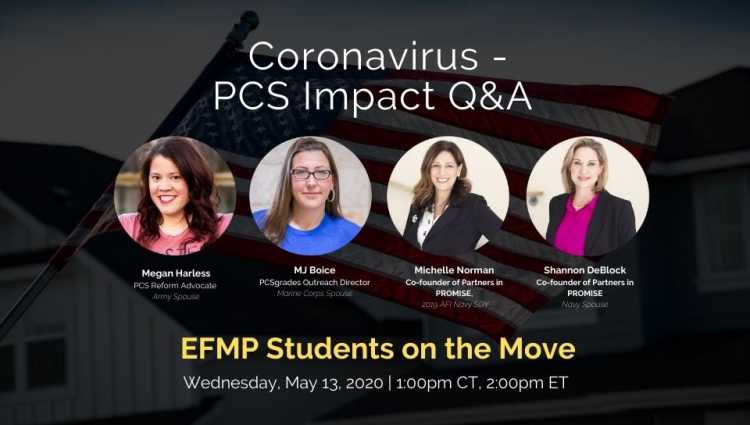Q&A About EFMP Students on the Move
by Lizann Lightfoot - September 14th, 2021

Our special guests are Michelle Norman, Co-founder of Partners in PROMISE and 2019 AFI Navy Spouse of the Year and Shannon DeBlock, Co-founder of Partners in PROMISE and a Navy Spouse.
What are some challenges that EFMP families are facing during COVID?
EFMP families now have a tremendous amount of new responsibilities: parents, protectors because of underlying and medically-complex conditions. We become the therapists because a lot of kids aren’t getting their usual services. And many families are geographically separated from their service member or their relatives. So you’re managing a household and you may be managing a PCS move too. It is a lot of burdens to try to manage at once.
IEPs are mandated by federal law, which says that every child is entitled to a free and appropriate public education (FAPE). There have not been any waivers, so each state is charged with implementing that education. Some districts are doing a fantastic job, with one-on-one zoom calls and modified lessons. Other districts aren’t doing anything at all because they don’t want to violate the law, so they are doing a huge disservice to all students. Online instruction may not be right for every student. Even some adults don’t have the attention and self-discipline to learn everything online. IEP is supposed to be individualized. Partner with your school district to choose what will work for each child.
The silver lining is that parents can finally see their child learning in action and determine what works for them. That will come in handy in the future when you are advocating for them.
IEP implementation looks different for every kid. A child who used to have one-on-one therapy or instruction several times per week will probably have fewer meetings now and fall behind. Many children have a max of 20 minutes during which they can be attentive online. Know where they are on their IEP goals and progress reports.
TLP (Transition Learning Plans) will show how much a child has missed or regressed. Take data, pay attention, take notes on a log sheet, or use the checklist on their website: Partners in PROMISE. Compare your original IEP to your Temporary Learning Plan. Then if the child is behind next year, it’s easier to advocate when you have exact numbers. Data drives everything, so record what is happening and what your child is missing. Keep everything scanned and in the Cloud too, so it won’t get lost or destroyed.
What should parents be doing to ensure their child doesn't fall through the cracks during a PCS move?
We suggest waiting to announce the PCS dates to your Extended School Year Services, which can be extra services during the summer. Don’t offer that information quite yet so you won’t miss out on summer activities and resources. Pretend you are going to be around for the next year so you can continue to advocate for your child. Invest in a binder specific to the pandemic period so you can keep all your documentation in one place, then hand-carry it with you when you move. It should contain evaluations, the current IEP, progress reports, and everything the new school would want to receive right away. (Our education experts recommend a PCS binder for all military students. More details are in our interview here.) Make contact with the new district as soon as you have hard copy orders. Ask if they will look at the IEP before you get there. Reach out to your current Special Education Teacher or child’s case manager to have them summarize their present level performance. Print out their emailed statements and put it in your binder.
What do you suggest for parents who are receiving pushback from their incoming district?
Sometimes the district won’t talk to you until you have a physical address in the area. You need to educate yourself and use the resources out there to know your child’s rights. We always say if you are having problems, contact your case manager and see what they can offer. We are pushing for remote enrollment for military families with hard copy orders, so you don’t have to physically be in the town yet. The Marine Corps, for example, has an advocate that can attend meetings and have access to a lawyer if necessary. Some bases have representatives, but not all do. Reach out to an EFMP case manager and let them know you are having issues. They need to know that there are problems with the school district. Contact your legal office to find out if they are available to help. You can also try Military One Source, but you need a live person to talk to. Wright’s Law online is a book that is like the Bible for advocacy for your child. COPAA (Council of Parents and Advocates and Attorneys) has a great rate for military families advocated by Jeremy Hilton.
Each district has a Special Education Citizens Advisory Committee. There are also Parent Training and Information Centers (PTI). Those parents can be a lifeline to help you. The MIC3 (Military Interstate Compact) has rules, but they aren’t always enforced. The child’s IEP should be up and running when they get there, instead of having a 30-day lack of support.
You can bring a voice recorder to meetings and share that file with your spouse if they can’t be there. Ask permission to record, and it will help the meeting stay focused.
How can we make things easier for EFMP families?
We could use the support like joining our newsletter and website to help advocate for laws in Congress to incorporate the initiatives we put forth in the PROMISE Act. We presented to Congress in February, and they listened because there hasn’t been many changes to EFMP for about 10 years. We need to keep advocating for change. Be supportive of the family next door and realize that we can work together on issues related to military families.
What do families do with multiple kids with different needs (special needs and typical)?
It can be challenging. They transition similarly, but the services for a special education student may not be available at your local school and they may need a long bus ride. So you have to evaluate where they both would go that would be close to where you would live. More often than not, the precedent will go to the child that has the greatest need. So the siblings of our special needs children are little heroes who make constant sacrifices for their siblings. When they transition, sometimes their needs are not as met as the others.
What tips do you have for EFMP families PCSing?
Go with your gut. You know your child best. If something doesn’t feel right, it probably isn’t. Find your tribe and put resources to work for you, because other people are going through the same thing as you. Don’t be too hard on yourself and take things one day at a time. We are all going to get through this together.
Stay organized and hand-carry your documents with you. Find spouses in the new location who can give you info about how things work in that area. Ask for introductions from a friend of a friend, they can be a great wealth of knowledge.






